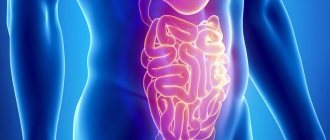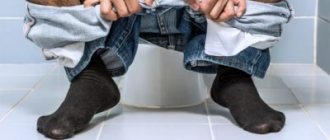Description
Abdominal pain and diarrhea that occur simultaneously can be caused by various factors. This could be indigestion, a viral infection such as stomach flu, or an intestinal illness. It is important to pinpoint the cause of your symptoms. This will determine what medications, home remedies and tips you can use to treat and prevent diarrhea and abdominal pain.
Abdominal pain occurs between the chest and pelvis. Abdominal pain can feel dull, aching or sharp. Signs of diarrhea include loose, bloody, or greasy calla lilies. The patient often needs to go to the toilet; the process of defecation is accompanied by pain and unpleasant sensations in the abdomen.
Causes
And so, cramps and diarrhea can occur for a variety of reasons. Let's take a closer look at them.
Fermentation in the intestines
Fermentation is an anaerobic process in the intestines, which occurs due to inadequate digestion of food, most often due to excess consumption of certain foods (white cabbage, dark yeast bread, kefir, milk, legumes, sausages, foods rich in sugar and starch).
Main symptoms
Fermentation in the intestines can be accompanied by the appearance of cramps and pain in the abdomen, bloating, rumbling, accumulation of gases, and diarrhea. In this case, feces often have a foamy-watery consistency, with a sour odor, yellowish color with mucus and often with the remains of undigested food.
The fermentation process not only causes discomfort, but is also dangerous, since due to the decay process, toxic substances (phenol, cresol, skatole and others) are released into the body, which are dangerous to the circulatory system, skin and liver function.
Diagnostics
Diagnosis is carried out by a general practitioner or gastroenterologist based on general complaints, examination, stool and urine tests, and ultrasound.
Treatment
Therapy consists of eliminating the causes that led to the fermentation process and restoring normal digestion. The following medications are prescribed to the patient: absorbents, enzymes, antispasmodics, painkillers, anti-diarrhea medications.
For successful recovery, it is important to follow a diet, lead a healthy lifestyle, and eliminate stress factors.
Be sure to watch the video on this topic
Gastritis
Gastritis is a chronic disease of the gastrointestinal tract, characterized by inflammation and dystrophic changes in the gastric mucosa, impaired regeneration and production of hydrochloric acid.
Main symptoms
Gastritis is often accompanied by pain in the upper abdomen, bloating, indigestion (diarrhea, constipation), nausea, heartburn, sour belching, vomiting, discomfort after eating, loss of appetite, and weight loss. Gastritis pain is aching or sharp, concentrated in the solar plexus area, aggravated or disappears when eating.
Diarrhea with gastritis is associated with disruption of digestive processes during an exacerbation.
The stool may have a mushy texture, light in color with impurities of undigested food.
Diagnostics
The diagnosis is made by a gastroenterologist and therapist based on the patient’s complaints, examination, ultrasound data, gastroscopy, x-rays of the esophagus and stomach, blood and stool tests.
Causes of abdominal pain and diarrhea
Most people experience sudden onset of abdominal pain and diarrhea. Frequent, persistent, or severe abdominal pain and diarrhea may indicate an illness or more serious medical problem. Diarrhea that gradually gets worse and bleeds may be a sign of a more serious problem.
Possible causes of abdominal pain and diarrhea:
- viral gastroenteritis (stomach flu)
- bacterial gastroenteritis (food poisoning)
- food allergy
- PMS (premenstrual syndrome)
- Irritable bowel syndrome is a common condition affecting the digestive system
- diverticulitis
- Lactose intolerance is the inability to digest lactose, the sugar found in milk and other dairy products
- intestinal obstruction
- colitis
- appendicitis
- parasites (eg giardiasis, amoebiasis or nematodes)
- bacterial infection (such as shigellosis or E. coli)
- drug allergy
- celiac disease
- Crohn's disease
- cystic fibrosis
- stress and anxiety
- some forms of cancer
Treatment options
To eliminate pain in the lower abdomen and diarrhea, you must first determine what exactly provokes the unpleasant symptoms. A therapist, gastroenterologist, proctologist, or oncologist can help in making a diagnosis. This will require an examination of the patient, possibly the use of abdominal ultrasound or computed tomography of internal organs.
In the future, when prescribing medications for diarrhea, the specialist focuses on the severity of the disease and the characteristics of its course. The patient’s condition must also be taken into account; in particularly severe cases (for example, with oncology), therapy is carried out in a hospital setting.
Patients may be prescribed:
- In case of poisoning, overeating, or intestinal infections, it is mandatory to use medications to relieve intoxication (Smecta, Activated Carbon, Polysorb, Enterosgel).
- For gastritis and peptic ulcers, there is a need to take antacids (Almagel, Phosphalugel). They have a calming effect on the gastrointestinal mucosa and neutralize the negative effects of hydrochloric acid. Medicines must be prescribed to eliminate the microbe Helicobacter pylori.
- To relieve pain . Unpleasant sensations can be relieved with the help of antispasmodics (No-shpa, Drotaverine).
- To restore the balance of intestinal microflora . Bifidum-bacterin, Eterol, Linex will help stabilize the level of beneficial bacteria in the intestines. These medications should be taken for almost all diseases accompanied by diarrhea.
When the cause of abdominal pain after diarrhea is appendicitis, the patient is usually hospitalized and prescribed special anti-inflammatory drugs and antibiotics. In some cases, urgent surgery is required.
If the patient’s condition does not improve during treatment at home, severe diarrhea persists, and unbearable pain appears, you should immediately call a doctor. Before the ambulance arrives, the main focus is on restoring the water-salt balance in the body.
Other causes of abdominal pain and diarrhea
Abdominal pain can be caused by diseases of other internal organs:
- kidneys
- spleen
- stomach
- gallbladder
- liver
- pancreas
If diarrhea and abdominal pain last more than one week and recur frequently, it may be a sign of an intestinal disease or disorder. We recommend that you consult a good proctologist if these symptoms last for more than 1 week.
The above conditions and disorders can cause swelling (inflammation) of various parts of the digestive tract, such as the stomach and intestines. Inflammation of the digestive system can cause cramps and disrupt the normal digestive process. This usually results in abdominal pain and diarrhea.
Why does diarrhea occur?
Diarrhea that lasts 1 to 2 days and does not cause pain can be caused by:
- food poisoning;
- alcohol poisoning.
Loose stools for 1, 2, 3 days can be observed during pregnancy and menstruation. The body is cleansed, then the functioning of the gastrointestinal tract is improved.
The cause of diarrhea may be:
- neurosis;
- food poisoning;
- intolerance to certain foods;
- acclimatization of the body;
- long-term use of medications that provoke diarrhea (anticoagulants, laxatives, synthetic sweeteners, antiarrhythmic drugs).
Diarrhea that occurs for one of these reasons goes away very quickly, literally in 3 to 4 days. If diarrhea is caused by one of these factors, it will not be difficult for you to figure it out. If stool disorder does not go away after 3-4 days, seek help from a specialist.
Weekly diarrhea may indicate one of the following diseases:
- intestinal infection (rotavirus, influenza, cholera);
- dysentery;
- intestinal tuberculosis;
- salmonellosis;
- exacerbation of an existing chronic disease (dysbacteriosis, colitis);
- enzyme deficiency.
Causes of abdominal pain and diarrhea in children
As in adults, abdominal pain and diarrhea in children occur due to infections, consumption of spoiled or low-quality products. Eating too much food can also cause these symptoms. Some children may have difficulty telling the difference between when they are hungry and when they are full. This can lead to overeating. Overeating puts stress on the digestive system, which can cause abdominal pain and diarrhea.
Which doctor should I contact for abdominal pain and diarrhea?
If you experience severe acute abdominal pain and diarrhea for more than three days, seek medical help from a proctologist. You also need to urgently contact the clinic if you have the following symptoms:
- frequent nausea or vomiting
- temperature above 38 degrees
- stool that contains blood or dried blood (that looks like wet coffee grounds)
Diarrhea is dangerous for children, older adults, and people with weakened immune systems. These groups of people need to seek help as early as possible.
Description of the disease
Diarrhea is a condition in which a person passes loose stool several times a day. This condition has 2 forms:
- spicy. Diarrhea may not stop for up to two weeks;
- chronic. Diarrhea may last more than two weeks.
Diarrhea is not considered a separate disease. It is rather a symptom that indicates any disruption in the functioning of the gastrointestinal tract. Diarrhea can be caused by various reasons. It manifests itself in adults and children. The condition is unpleasant and brings a lot of discomfort if it occurs in adults. But, if it is observed in a child, parents are overwhelmed with anxiety and not in vain.
Diarrhea can occur every hour if you have irritable bowel syndrome. Frequent diarrhea can be a consequence of the activity of infectious pathogens and parasites.
You can ignore the malaise, which lasts 1–2 days, but if the diarrhea cannot stop on the 6th day, you need to contact a specialist. If you do not seek help in a timely manner, various complications may arise. It is very important to know the reasons for prolonged diarrhea and how to get rid of diarrhea.
If, in the presence of diarrhea, an adult does not have stomach pain, then the body independently cleanses the gastrointestinal tract of toxins, mucus, and rotting products that accumulate after stagnation inside the tract. This functional disorder may disappear on the second day after following the diet. If diarrhea persists for 4 days or more, contact a specialist.
Diagnosis of abdominal pain and diarrhea
To determine the cause of your abdominal pain and diarrhea, your doctor will first do an exam and ask some questions about your health and lifestyle. Traveling to other countries may increase the risk of digestive tract diseases. Don't forget to mention your recent trips abroad. Your doctor will ask questions about any recent changes in your diet.
During the study, you will need to undergo a stool test. The sample will be sent to a laboratory to test for bacteria and viruses.
We conduct the following research:
- Endoscopy: The doctor examines the digestive tract and stomach for ulcers using a camera and endoscope through the mouth.
- Colonoscopy: The doctor inserts a camera into the rectum and examines the intestines for lesions, ulcers, and polyps.
- X-ray of the intestine: the specialist will take a real-time X-ray of the abdominal cavity. A barium-based contrast agent is injected into the rectum to check for bowel patency.
Treatment of diarrhea and abdominal pain
In most cases, it is possible to cope with the disease at home with the help of medications. We recommend that you consult a proctologist; the doctor will draw up an individual effective program of conservative treatment. Treatment for abdominal pain and diarrhea depends on the disease causing the symptoms.
Treatment of diarrhea and pain relief involves the use of drugs:
- antibiotics - to treat bacterial infections, including food poisoning
- allergy medications
- antidepressants to treat stress and anxiety
- prescribing non-steroidal anti-inflammatory drugs (NSAIDs) to treat PMS
- antiparasitic drugs to kill parasites
We strongly advise against self-treatment, because you may choose the wrong method, which will only aggravate the situation and you will spend extra money on unnecessary expensive medications.
What to do if your stomach hurts and you have diarrhea? Lower abdominal pain and diarrhea in women
It is impossible to answer in a nutshell why the stomach is boiling, the stomach hurts and the diarrhea is getting worse, since there are many reasons for this.
Often such symptoms in an adult occur due to banal food poisoning, for example, after eating unwashed fruit or spoiled dairy products.
In an infant, diarrhea can begin from no less banal overfeeding or improper introduction of complementary foods.
The reasons may also be the following:
- bacterial infection - Vibrio cholerae;
- tuberculosis or salmonella bacilli;
- parasites - the lower abdomen hurts and itching in the anus;
- intestinal dysbiosis, often provoked in adults by uncontrolled use of medications;
- disturbances in the functioning of the digestive system - lack of certain enzymes;
- poisoning with poisons - salts of heavy metals, after excessive consumption of alcoholic beverages;
- intestinal pathologies - inflammation, ulcers, malignant neoplasms in the anus;
- inflammation of hemorrhoids in the anus.
And these are not all the explanations why diarrhea suddenly begins. For example, women often experience intestinal disorders before or during their periods. In this case, as a rule, the lower back and lower abdomen ache.
In some cases, the symptoms go away on their own within a day or two. But if you experience chills, pain in the anus, stomach, right side or lower abdomen, you need to consult a doctor. He will find out why this happens and prescribe effective treatment.
Often, if diarrhea occurs, there is pain in the lower abdomen, lower back, in the anus or in the right side, and none of the reasons are suitable, the matter is a violation of the fermentation process in the stomach and intestines.
In this case, the following characteristic signs will be noted:
- First, there is rumbling in the stomach, after which the lower abdomen begins to swell.
- After this, the rumbling in the stomach will turn into pain and diarrhea will begin, while the stool will foam.
- When defecating, feces will come out very violently, with a characteristic sour odor.
The biggest danger for both adults and children is dehydration after excessive diarrhea and vomiting.
And if there are also chills, fever, headache, pain in the right side or lower back, unpleasant pulling in the lower abdomen, we are talking about severe intoxication. Treatment should only be determined by a doctor.
Quick help at home
With severe diarrhea, a person quickly loses fluid, and along with it, microelements necessary for the normal course of metabolic processes in the stomach and intestines are washed out:
- To restore the water-salt balance, you need to drink as much warm salted water as possible. It is permissible to replace it with weak tea, but only without sugar - it can increase fermentation in the gastrointestinal tract.
- There is no harm in taking activated carbon - it adsorbs toxins and quickly removes them from the body. Pain in the stomach and anus should subside on the second day after taking charcoal, and the diarrhea will gradually stop.
- If you have severe pain in the lower back or right side, if your lower abdomen is tight, you can take a No-shpa tablet, but no other painkillers or antipyretics should be taken without a prescription, even if severe chills occur.
Moreover, you should not try to suppress the infection with antibiotics until it is precisely determined what caused it.
Usually, with prolonged diarrhea, when the lower abdomen, lower back, pain in the right side are disturbing, the mucous membrane in the anus and the skin around the anus are always irritated. To avoid additional discomfort, after each bowel movement you should wash yourself or use wet wipes and lubricate the skin with a rich cream.
You should also remember about a special diet for diarrhea.
On the first day, it is better to refuse food altogether and limit yourself to only water and tea - anyway, the products will not be absorbed and will only irritate the mucous membranes even more.
On the second day, you can eat 2-3 tablespoons of salted rice porridge in water without oil at intervals of two hours. Rice is also a good adsorbent and has a fixing effect due to its high content of starchy substances.
But the porridge should be viscous and well cooked. Thick jelly, such as oatmeal, will also be useful.
It is prohibited to supplement the diet until the intestinal functions are fully restored and pain in the right side and lower back disappears:
- fresh fruits and vegetables;
- dairy products;
- fish.
As the condition improves, you can gradually introduce:
- weak broths;
- mashed potatoes;
- steamed meatballs;
- hard-boiled eggs.
If you have fermentative diarrhea, you must definitely consume fermented milk products. But with putrefactive diarrhea, it is better to stick to slimy porridges and dried bread.
Self-help for the body
As you can see, pain in the lower abdomen and diarrhea can appear for many reasons, which are often not possible to determine on your own. For proper treatment, you definitely need to go to a medical institution, but before that you can alleviate the symptoms a little yourself and help the body.
The following recommendations are common to all of these diseases; they are aimed at speedy recovery of the body.
First of all, you can drink activated carbon. It copes well with pathogenic microflora of the intestines and stomach. Since when vomiting occurs the body is dehydrated, it is recommended to drink saline solutions. This procedure quickly restores the water-salt balance, stops vomiting, and reduces diarrhea.
Dysentery
Dysentery is a bacterial infection of the intestinal tract caused by the penetration of Shigella into the body. Transmission of the disease occurs via the oral-fecal route, i.e.
a person who consumes infected food and water receives the pathogen.
The appearance of symptoms characteristic of dysentery occurs after bacteria penetrate into the lumen of the large intestine and begin active reproduction.
The duration of the incubation period is variable: it can be several hours or two to four days. The main signs of dysentery include:
- Diarrhea. The disease begins with severe stool disorder. It can become either completely liquid or mushy. Contains blood streaks and pus impurities. In severe cases of the disease, stool is a mucous mass that does not contain feces as such.
- Stomach ache. At the stage of dysentery formation, a person is not able to indicate the place of their localization. As the number of bacteria increases, they become stronger and move lower in the abdomen. The pain is cramping in nature, also described as cutting, accompanied by intestinal spasms. After emptying, they subside.
- Tenesmus.
- Increased body temperature. In severe cases it rises to significant levels.
- Intoxication of the body. Its symptoms include headaches, general weakness, nausea, anorexia, and decreased blood pressure (BP). The severity of symptoms depends on the severity of the condition.
Important! The greatest danger of dysentery is dehydration caused by large loss of fluid.
Treatment of the disease comes down to following a diet and taking various groups of medications. The patient needs hospitalization, since the disease is contagious, and semi-bed rest.
Pain in the left lower abdomen in men
What can and should be done before consulting a specialist
If, nevertheless, you made a mistake by not listening to the above advice, and pain visited you, and trips to the toilet became regular, first of all, you need to:
- Refrain from eating.
- Provide yourself with clean water and plenty of fluids.
- If there is no increase in temperature and vomiting, take painkillers (activated carbon, smecta).
- In severe cases, call an ambulance or consult a doctor yourself.
Intestinal infections
Unpleasant symptoms can be caused by the Salmonella bacteria.
Poisoning should be mentioned since it is the most common cause of dyspeptic symptoms, including diarrhea and nagging pain.
Why do pets calmly drink water from puddles, eat unprocessed food and do not suffer at all? Without a doubt, primitive man had a similar intestinal microflora and could calmly eat food that would make us sick in a matter of minutes today. But we have evolved, taming fire and starting to use heat treatment of food.
This is evidenced by current facts: many tribes living in hard-to-reach places and leading the lifestyle of their ancestors have a much more developed set of microorganisms that can easily process food contaminated with many types of pathogenic bacteria.
We have to take care that the food we eat goes through all the required stages of hygienic processing. But this is not always the case.
It is enough to eat a poorly washed vegetable/fruit, or eat poorly cooked/fried meat or fish - and we are guaranteed discomfort in the intestinal area.
In some cases, an exacerbation occurs several hours after eating low-quality products, sometimes after two or three days.
Home Remedies
It is important that people experiencing abdominal pain and diarrhea stay hydrated. Drink plenty of clear liquids such as water, juice and broth. Avoid caffeine and alcohol.
As your bowel movements become more regular, eat small amounts of diet foods such as porridge, rice and eggs. Avoid spicy, fatty and high-fiber foods. They can worsen inflammation in the digestive system.
Probiotics can help your digestive system heal. Natural probiotics are found in foods such as yogurt.
You can take herbal supplements that are considered beneficial:
- blueberry;
- Melissa;
- chamomile.
Treatment
Treatment for diarrhea should be comprehensive.
Diet
The goal of dietary nutrition for prolonged diarrhea is to reduce intestinal motility and create conditions for the restoration of damaged cells.
Basic principles
- Individuality - the diet is made taking into account the severity of diarrhea and its cause. If you have lactase deficiency, avoid whole milk; if you have celiac disease, avoid products containing gluten.
- Fractional meals - eating in small portions, 5-6 times a day according to appetite.
- Mechanical sparing - dishes are boiled and chopped. Avoid vegetables and fruits rich in fiber.
- Chemical sparing - exclude spicy foods, seasonings, spices, alcohol.
- Temperature regime – the optimal food temperature is 15-60 °C.
- Exclusion of foods that enhance fermentation and putrefactive processes in the intestines.
Grocery list
| Recommended | Forbidden |
|
|
Read more: Diet for diarrhea: list of products and sample menu for the week
Drinking regime
Fecal masses with diarrhea contain up to 90% water. To prevent dehydration, it is important to compensate for fluid and electrolyte losses. Drink at least 2.5 liters per day. The exact volume of fluid taken is calculated by the doctor.
Be sure to read:
Questions and facts about intestinal microflora
Salt-free solutions
- sweet tea with lemon;
- rosehip decoction;
- dried fruit compotes;
- blueberry, pomegranate juices, diluted in half with water;
- rice water
Glucose salt compositions
- pharmaceutical products – Regidron, Citroglucosolan, Orasan, Gastrolit;
- homemade solution - measure a liter of warm boiled water, add a teaspoon of salt, 3 tablespoons of sugar, a teaspoon of baking soda, mix well.
Alternate these compositions. The optimal ratio of salt-free and glucose-salt solutions for diarrhea is 1:2.
Medicines
- Antibiotics – prescribed for specific intestinal infections. Drugs of choice for dysentery: Ceftriaxone, Ciprofloxacin; for campylobacteriosis - Azithromycin; for amebiasis - Metronidazole. Subsequently, antimicrobial therapy is adjusted based on the results of bacteriological examination.
- Sorbents. Polysorb and Enterosgel adsorb and remove bacterial toxins and cell decay products from the body.
- Enzyme preparations. For diarrhea, medications without bile acids are prescribed: Creon, Pancitrate, Mezim forte.
- Enveloping agents. Smecta and Attapulgite stimulate the formation of mucus and reduce gas formation.
- Drugs that inhibit intestinal motility . Loperamide and Imodium are prescribed only for non-infectious diarrhea. For intestinal infections, they are strictly contraindicated, as it increases the residence time of bacteria and their toxins in the intestines.
- Probiotics. Scientists have proven that drugs containing various strains of lactobacilli (Lactobacterin) reduce the duration of infectious diarrhea by 1 day. For diarrhea caused by intestinal dysbiosis, combined drugs are prescribed: Linex, Bifiform.
Read more: Tablets for diarrhea: list of drugs and their use
How to prevent stomach pain and diarrhea?
Follow our dietary tips to prevent indigestion and upset stomach:
- eat balanced and nutritious food;
- limit alcohol consumption;
- eat less spicy and fatty foods;
- drink plenty of water;
- Wash your hands frequently to prevent infection with viral infections that cause these symptoms;
- Maintain hygiene when preparing food. Clean kitchen countertops frequently and store food properly;
- Avoid drinking tap water.











